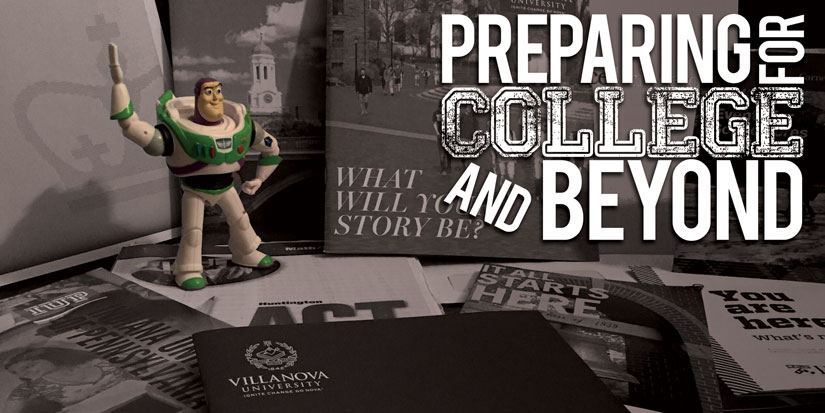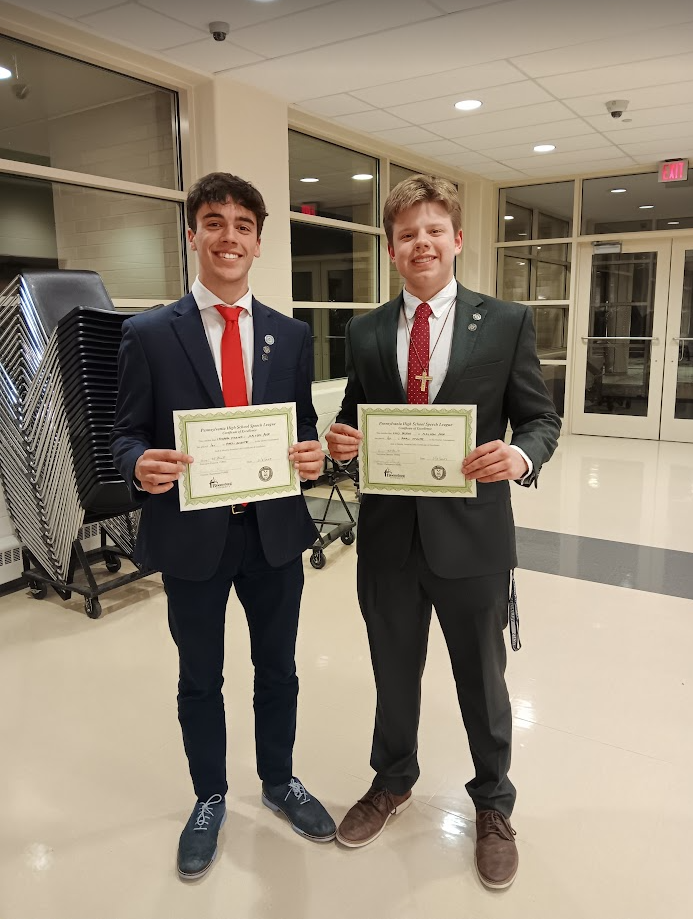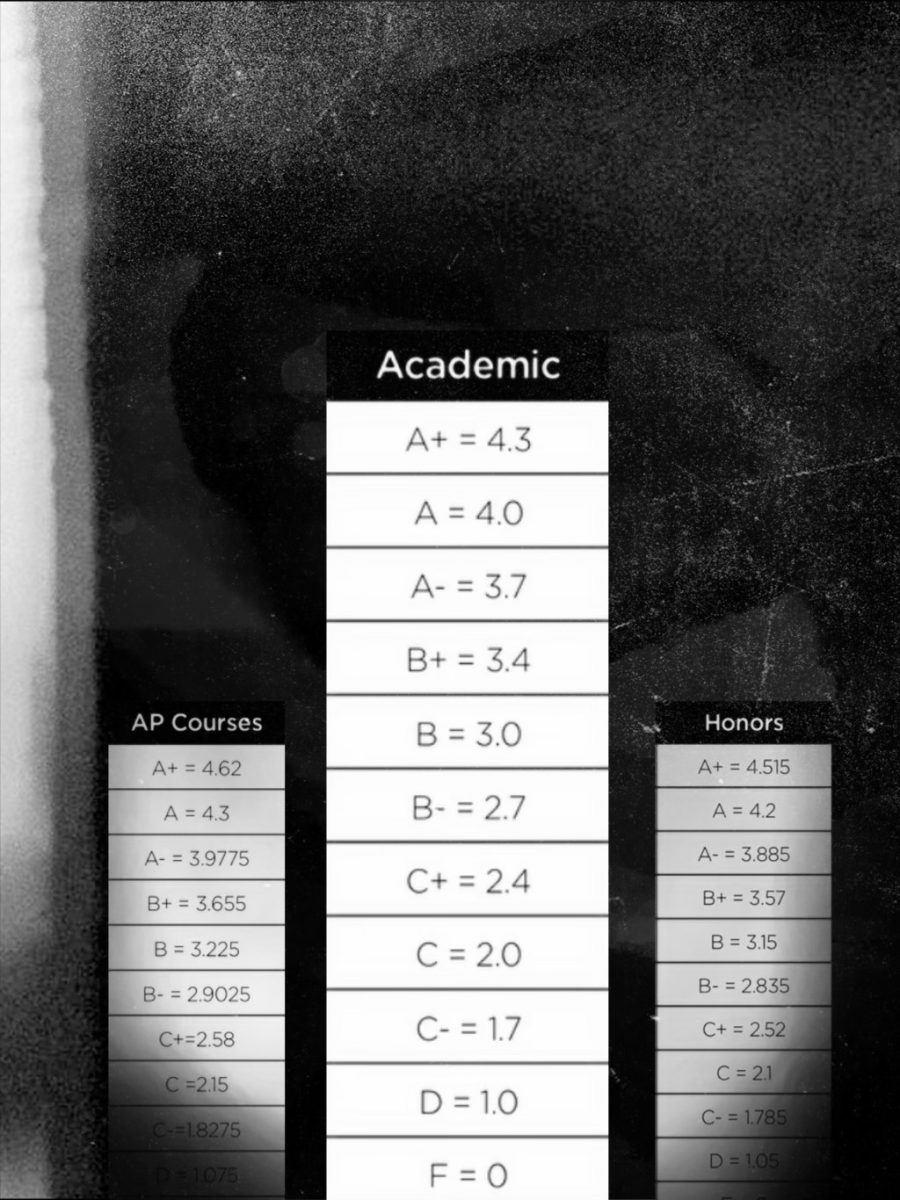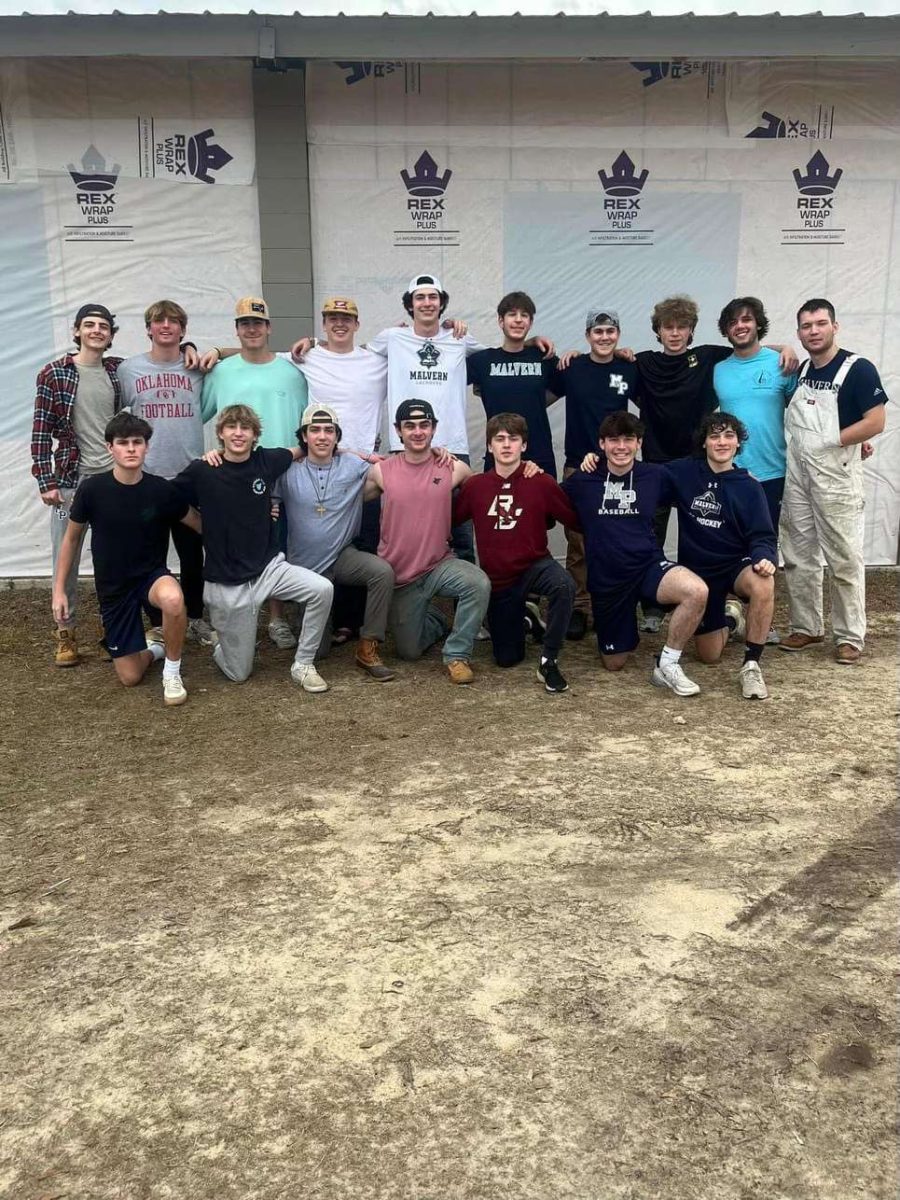
For seniors, college is right around the corner. Some know exactly where they are going. Some don’t have a clue.
Spring break is over and seniors like Robert DiCicco have just made the decision on where they will be spending the next four years of their life.
“Next year I will be attending the University of Virginia. I actually did not think I was going to be accepted there, but I got in early,” DiCicco said.
DiCicco said he did not get into the schools he was hoping for. “I was waitlisted at my top two choices and the whole time, the suspense was killing me,” he said.
Senior Liam Moran wishes he went about the whole process a little differently.
Moran wishes he spent more time thinking about his major and looking into schools that support that major. When he got his acceptance letters, he didn’t realize how important these schools were because he didn’t do any research on his own.
“I don’t want the guys at Malvern to do what I did,” Moran said. “I let my parents make my college list for engineering so when they told me I got into places like Rensselaer Polytechnic Institute (RPI), I wasn’t thrilled because I didn’t know much about it.”
Moran’s advice for sophomores and juniors is to get involved in the process and figure out which schools you really want to go to. That way those acceptances will feel way more important and genuine.
The period surrounding college decisions should be one of excitement and anticipation. However, increasing selectivity, pressure to apply to top-tier universities, and an ever-changing academic climate instead results in a stressful chapter in students’ lives.
Before this year’s seniors celebrate their graduation, The Blackfriar Chronicle wanted to learn from their experiences, and from the perspective of a college counseling office that is evolving as colleges boast greater selectivity each year.
TOUGH DECISIONS ON LIMITED SLEEP
 At a challenging college prep school, students like DiCicco must tackle intensive classes, work diligently in various activities, and learn how to operate on limited sleep. The modern-day college process has become but another source of stress.
At a challenging college prep school, students like DiCicco must tackle intensive classes, work diligently in various activities, and learn how to operate on limited sleep. The modern-day college process has become but another source of stress.
“Trying to manage being a MECO leader and performing for MTS on top of doing all my college applications made the process a little daunting,” DiCicco said.
Malvern’s college counselors encourage students to put in the time on the front end of the college process to ensure that when the time comes to make a decision about applications, that decision will be an educated one.
Senior Colin Wills wishes that he had spread his college application work out a little more over the summer before senior year. “I definitely think maybe Malvern counsellors should remain in contact with students a bit more throughout the summer into senior year to make sure kids are staying on track, researching colleges, preparing for tests,” he said. “I kind of fell off and became really lazy, which happens when I have too much free time. I just overall become less productive.”
“We always tell our students to do their homework ahead of time,” Director of School Counseling Mr. Paul Simpson said. “Visit the campus, talk to people from that school, get in contact with any Malvern alumni that go to that school, anything like that. All those pieces make the process a little easier when it gets to crunch time.”
According to The New York Times, colleges nationwide are receiving record numbers of applications that are drastically decreasing their acceptance rates, while increasing students’ stress rates. Applications at 70 percent of colleges and universities have increased each of the last ten years. The article described colleges’ “arms race” toward higher selectivity in an effort to improve their rankings. Students feed into that race by applying to so many colleges.
“The college process has definitely gotten harder over the last couple of years and it is important for students to realize that,” Simpson said. Simpson, who graduated from Malvern in 1986, attended Dartmouth University. “I think the acceptance rate at Dartmouth now is about 10%. When I went there, the acceptance rate was probably more than double that.” (Dartmouth’s acceptance rate for 2016 is 10.52%, according to businessinsider.com.)
Director of College Counseling Mr. Ian Harkness estimates that most Malvern students apply to six or seven colleges.
“I once had a student who applied to 33 colleges and I would never let something like that happen here,” Harkness said. “What that shows me is the student really didn’t listen to his counselors and really had no plan. The process starts early here because we really want students to be thoughtful about it.”
The college process definitely wasn’t easy for Jack Marchesani ’15 and it seemed like it took an infinite amount of hours. To him the deadlines seemed to be ten days before he thought they actually were and since they were all bunched up, it was easy for him to procrastinate.
“On top of that madness, I was competing with a hectic first semester senior year. It was this weird balancing act where I had to decide what was more important: the work I was trying to do that would secure my future or the application that was representing that work,” Marchesani said.
According to Simpson, it’s always going to be a tough process but the work that seniors and alumni put in always pays off in the long run.
Once the applications are in, it’s a waiting game.
“I don’t know if there is a way to replace the stress of waiting to hear from the schools, but ultimately the goal for students should be to have options,” Simpson said. “He should be like ‘ok, now I can compare this school to this school whether it’s a financial conversation, a social conversation, which school is better for my major, etcetera.’”
Many seniors report anxiety about the waiting, and about making the final decisions.
“My number one choice has jumped around about 3 or 4 times,” senior Josh Zegel said. “You think you love one school, but then you find another one you like more. It’s just hard to know which one is the best and it makes the final decision so much harder.”
Sometimes the burdens of high school life and the timing of college decisions make students forget to talk about their anxiety with those who can help them most.
“When I look back on some instances in the past, I realize that students that have been really stressed sometimes didn’t communicate it well with me,” Simpson said.
Counselors do not hear back from colleges – students do. A majority of those acceptance letters, waitlist letters, or rejection letters arrive over spring break, according to Simpson.
“On top of a really stressful process we have really unfortunate timing. I encourage my students to reach out to me over the break and communicate how everything is going so I can stay in the loop,” he said.

COUNSELING STRATEGIES
The stress might not be the easiest thing to control, but Malvern’s counseling department is adapting their focus to how they can best help students as the college process becomes even more competitive.
Simpson said that the department began to adopt a new approach to college counseling about six or seven years ago, as part of the school’s strategic planning process.
“I think that the Board of Trustees had the impression that our students were not applying to the more competitive colleges and were not being successful at schools when they did,” Simpson said. “The conversation with the Board definitely was one in which they said we needed to improve. And I realized that, too.”
For the counseling team, success is in the eyes of the beholder. Statistics look nice, but what they are truly concerned with is making sure the student makes the best choice for him as an individual.
“Unfortunately we are measured by websites like Forbes and US News and World Report by how many kids we got in the Ivies, or how many students we send to Catholic schools. But those statistics don’t define who we are as an institution,” Simpson said. “The board understands that and ultimately they let us make the decisions we think are best for the students, not for our numbers.”
“If a student was applying to all eight Ivies, I’d have a big problem with it,” Harkness said. “It’s not that I don’t think they can do it but are you really going to like Dartmouth and Columbia or are you just applying for the name? Stuff like that is why acceptances rates are so low.”
Simpson believes that the biggest improvement in the process over the last few years is the addition of the counseling curriculum
“We are able to have a lot more discussion around the college process when [the students] are juniors and then also in the fall of senior year when we start to get into the ‘to do list’ of the college process,” Simpson said.
However, not everyone in the senior class agrees that the counseling classes are always helpful. Some offered suggestions on how to improve the process.
“Some of the classes really helped me a lot. The ones where you actually do things to help with the college process like start writing the common app essay are extremely important in my eyes,” senior Student Council president Alex Freud said. “But some I didn’t think helped at all, like the stress management information sessions.”
Freud acknowledged that topics related to college adjustment may be important for some, “but personally I just wanted to get college stuff done during these periods,” he said. “The classes are great if you use them well. I know I would’ve procrastinated if I didn’t have an hour period every cycle to work.”
DiCicco agreed that he wished more time had been dedicated in counseling classes to the common app and supplemental essays. “The essay component was the only part of my application where I felt Malvern could have done more to help me and my senior brothers,” he said.
Malvern’s counselors, like Simpson, feel the counseling class also helps develop the close, unique connection between mentor and student that they feel it is conducive to success.
“At Malvern, because we now have the benefit of knowing our kids longer, we really get to look ahead and see what could be a hook for one student or an obstacle for another,” Simpson said. “I think that is the advantage of an independent school like Malvern because we do try and individualize the process for each student.”
 MISPERCEPTIONS AND REALIZATIONS
MISPERCEPTIONS AND REALIZATIONS
High school guidance counselors and admissions experts say the heightened competition is actually becoming a bad thing, turning the process into a anxiety-ridden numbers game.
“The fact that students are just applying to Ivies for the name rather than actual fit, make the highly selective schools look even more competitive,” Harkness said. “To get into a Harvard or Princeton, even as a top applicant, now requires hitting the lottery basically.”
Simpson holds that the process is intensified because of Malvern’s location. “You always have to think of where we are located. Most of us live in the Philadelphia area, just a few miles from The Main Line,” Simpson said. “We have great independent schools, great public schools, and just an overall flourishing academic environment which can lead to pressure for students to perform at higher levels. That is why the college process is so competitive these days.”
When applying to colleges, college counselors emphasize the idea of fit above the college’s prestige factor.
“Prestige is not everything and that’s something I think people often forget,” Simpson said. “We have a lot of successful parents right here at Malvern. If we polled them, I’m certain not all of them went to prestigious colleges and I’m sure many went to colleges we’ve never even heard of before.”
According to a study conducted by researchers at Gallup and Purdue University, factors like the whether the college is very selective or nonselective hardly matters at all to alumni’s well-being and success in comparison to their actual experiences in college.
The study concludes that if graduates had a professor who cared about them, sparked curiosity within their field of study, and offered outlets to apply what they learned, their chances of thriving in the workplace and in their well-being double. If graduates had an internship or job where they were able to apply what they were learning in the classroom, were actively involved in extracurricular activities and organizations, and worked on projects that took a semester or more to complete, their odds of being engaged at work also double.
What we can learn from this data is that feeling supported and encouraged to pursue dreams are paramount when it comes to long-term outcomes for college graduates. Students have a better chance of finding those things when they apply for fit rather than prestige.
Still, the prestige of the list of colleges that Malvern students attend seems to important to the school. The school lists college acceptances online. A stated goal of the 2011-2016 strategic plan is to provide students with “the structure and tools to identify and gain admittance to the most selective national colleges and universities.” Board Chairman Mr. Steve Cloetingh announced at a March 8 Town Hall that this year’s college acceptances mark “the best results seen in 50 years.”
“I think our results are incredibly strong but that’s what I would expect from a place like Malvern,” Harkness said. “I already know we have extremely capable students here, so I’m most excited to see each young man find his fit.”
Going forward, it is beneficial for students to take tips from the counselors and know that they are doing everything possible to ensure the process goes smoothly.
One major focus for Harkness is building relationships with colleges.
“I view my role as much as an external advocate for the Malvern brand, for the brotherhood, so people that don’t know Malvern get to know what makes us special and different from schools like Haverford, EA, and St. Joe’s,” Harkness said. “Once [college] administration officials realize how incredible four years at Malvern truly is, it gives validity to each application a student sends from our school and makes it much harder for the college to say no.”
Counselors believe it is important for students to do their part to ensure this validity as well.
SENIOR SLIDE
The senior slide tradition, when seniors begin to slack towards the end of their high school career, threatens four years of work and can inhibit one’s ability to actually compete and do well once they reach college, according to Simpson.
“The studies I have seen about the senior slide show that the way students finish their senior year of high school is exactly how they start their freshmen year of college. So it’s not as easy as just flipping the switch because you’ve built six months of bad habits,” Simpson said.
DiCicco shares this perspective on senior slide.
“Personally, I do not know why anyone would sell themselves short in the home stretch,” he said. “To take your foot off the gas pedal this late in your Malvern career would be foolish.”
DiCicco has noticed some of his peers shifting focus during senior year. “I have noticed my classmates dedicating more time to – say – an extracurricular activity rather than their studies,” he said. “I believe the first year of college is going to be a difficult year for most, but Malvern has given us the tools to succeed as long as we work to the best of our abilities.”
Simpson believes that slacking off can make the transition to a great college more difficult. “When you get to college, there are a ton of gifted people who are very serious about their success,” he said. “To me, it was exciting because I enjoyed that challenge. But to others it may seem intimidating, especially after slacking for so long.”
Senior Matt Kropiewnicki has a different opinion. “I don’t think sliding is as harmful for college as everyone makes it out to be,” Kropiewnicki said.
He noted that during senior year, the only motivation a student has to do well is himself. If he doesn’t care about the classes he is taking, he won’t do the work. When that students gets to college, however, Kropiewnicki thinks that motivation to work hard and do well usually comes back.
“College is a whole other animal because the things you’re learning actually matter to you, and your grades actually “matter” again,” Kropiewnicki said. “The threat of a rescinded application is not as real as everyone thinks it is, but the idea of flunking college certainly is.”
AND BEYOND…
For Malvern’s administration, success in college and finding the perfect fit are not the end goals, but rather, success in life.
“We celebrate every decision, and as a college prep school we take pride in placing 100% of our students in a four year college,” Simpson said. “But that is not the reason I love Malvern and my job.”
“I love my job because I see teenagers grow into capable and mature young men. It sounds cliché, but I want our students to be able to change the world,” he said.
“I really think that we educate the whole student. We try and educate students spiritually and emotionally and help them discover who they currently are and who they want to be in the future,” Simpson said.
For Simpson, it helps if we can reflect on our Augustinian values to guide us to our true vocation. Malvern is currently teaching skills like collaboration and problem solving that, in Simpson’s opinion, are way more important in life after college than how much calculus you know or much history you’ve learned.
“It is important to have these skills and values so that no matter which career path you go down so you can be a lifelong learner, an empathetic individual, and know that Malvern gave you a head start.”







